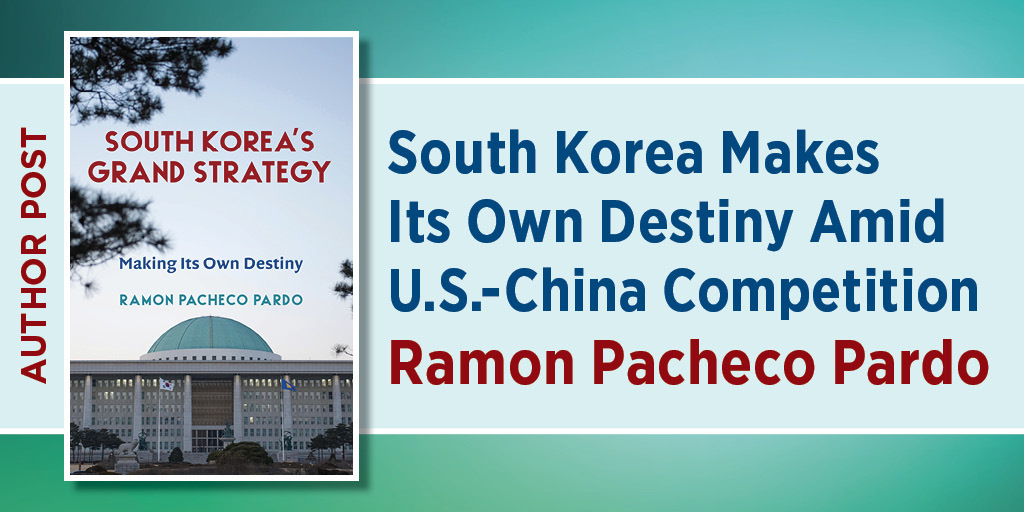South Korea Makes Its Own Destiny Amid U.S.-China Competition
Ramon Pacheco Pardo

Sino-American competition is the key driving force of twenty-first-century geopolitics. Whether consciously or unconsciously, all other countries have to define grand strategy and foreign policy in response to the actions and interactions between today’s two only superpowers.
No country is more aware of the need to and difficulties in navigating the competition between China and the United States than South Korea. Washington is Seoul’s closest security and diplomatic partner, with the bilateral alliance between the two of them celebrating its seventieth anniversary in 2023. China, meanwhile, has a millennia-old history of interactions with Korea, shares a 1,416-kilometer long border with the Korean Peninsula, and is North Korea’s only ally. China has also been South Korea’s largest trading partner since the turn of the millennium, with the United States ranking at number two and also as the largest investment partner.
This situation could pose an unfathomable dilemma for South Korea. But, as I show in my book South Korea’s Grand Strategy: Making Its Own Destiny, the country has a well-defined grand strategy dating back to its transition to democracy in the late 1980s—and which both conservative and liberal governments uphold.
Above all, South Korea wants independence of action—as is common for middle powers. And how does this look in practice, as Seoul confronts competition between Washington and Beijing?
No country is more aware of the need to and difficulties in navigating the competition between China and the United States than South Korea.
To begin with, South Korean policymakers see the alliance with the United States as an enabler rather than a constraint. This helps explains why no mainstream South Korean leader questions the value of the alliance to support Seoul’s interests. Crucially, this includes guaranteeing the country’s protection against the threat that many in South Korea believe China poses.
For well before China’s (alleged) aggressiveness became a mainstream topic in the United States and Europe, South Korean leaders were wary of Beijing due to territorial and historical disputes, economic competition, or its military, economic, and diplomatic support toward North Korea. Even though the ROK-U.S. alliance continues to be primarily focused on deterring North Korea, South Korean policymakers have long understood that Washington also supports Seoul’s security against Beijing. It is therefore unsurprising that both the Moon Jae-in and Yoon Suk-yeol governments issued joint statements with the Biden administration denouncing China in all but name.
This does not mean, however, that South Korea will simply give up on diplomatic and security engagement with China. Every single South Korean president dating back to the 1990s has sought to boost political exchanges and military-to-military ties with China. After all, China will continue to be (South) Korea’s neighbor no matter who the leader in Seoul or Beijing is. And South Korean leaders understand that one way to seek to reduce security and diplomatic frictions with China is via dialogue.
At the same time, South Korea needs to navigate economic and technology competition between China and the United States. Yet South Korea has long been clear-eyed about the economic opportunities but also the potential threats that come from trade and investment ties with China. Dating all the way back to the early 1980s, South Korean chaebol and other firms have understood that the Chinese market offers huge opportunities—but also that Chinese companies could very well become direct competitors one day. This explains why both the South Korean government and its firms have been seeking to diversify economic ties for many years, long before “derisking” and “decoupling” became the buzzwords that they are today.
Every single South Korean president dating back to the 1990s has sought to boost political exchanges and military-to-military ties with China.
As a poignant case in point, South Korean firms opening factories in the United States is not a new phenomenon, even if the Biden administration’s Inflation Reduction Act (IRA) has served to attract even more investment from its chaebol. After all, the Roh Moo-hyun and Lee Myung-bak governments targeted a free trade agreement with the United States as the biggest prize in South Korea’s trade strategy.
This means that the characterization of South Korea as being sandwiched between its security ally, the United States, and its top trading partner on which its economy is dependent, China, is misleading. The South Korea–China economic relationship is better defined as one of interdependence.
Yet again, this does not mean that South Korea will unnecessarily seek economic confrontation with China. Quite the opposite. Together with the rest of East Asia, Seoul signed up to the Regional Comprehensive Economic Partnership (RCEP) anchored by Beijing. South Korea has also joined the Digital Economy Partnership Agreement (DEPA), an Asia-Pacific deal that China also wants to join. And the Park Geun-hye government famously signed a bilateral free trade agreement with China in 2015, taking Sino-South Korean relations to their highest point since the restoration of bilateral diplomatic ties in 1992.
It is thus clear that South Korea is not going to be pushed into “choosing sides” between the United States and China. Seoul will maintain links with both, even if they will continue to be stronger with Washington compared to Beijing.
At the same time, it is disingenuous to argue that South Korea has taken a “balanced position” between the United States and China. No South Korean president has taken such a position in practice, regardless of their words. The value of the ROK-U.S. alliance, not to mention shared interests and values between Seoul and Washington, explains why South Korea has been and will continue to be much closer to the United States.
Yet South Korea’s grand strategy is based on the idea that the country should maintain its autonomy. And this will inform its approach to U.S.-China competition.
Ramon Pacheco Pardo is professor of international relations at King’s College London, the KF-VUB Korea Chair at the Brussels School of Governance at Vrije Universiteit Brussel, and is the author of South Korea’s Grand Strategy: Making Its Own Destiny.




